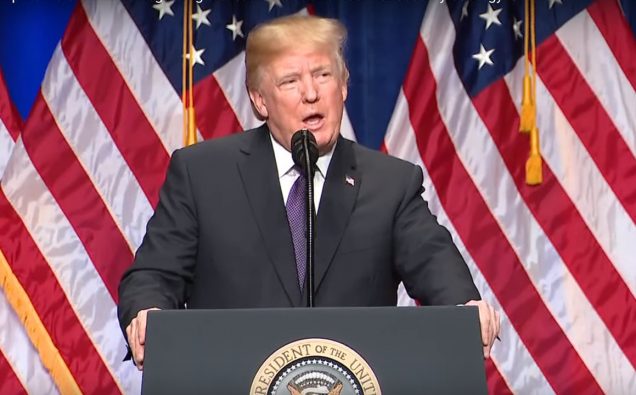
The United States views risk of a Pakistan-India conflict resulting a in nuclear exchange among its chief concerns in South Asia.
A White House document detailing President Donald Trump’s national security strategy also sees leadership role for India in the broader region and vows to press Pakistan on countering terrorist threat.
“The prospect for an Indo-Pakistani military conflict that could lead to a nuclear exchange remains a key concern requiring consistent diplomatic attention,” the strategy says.
President Trump also unveiled his new strategy in a statement, noting that in Afghanistan, the American troops are “no longer undermined by artificial timelines, and we no longer tell our enemies of our plans. ”
“We are beginning to see results on the battlefield.”
On Pakistan, he renewed Washington’s demand that the country do more in combating terrorist groups on its soil.
“And we have made clear to Pakistan that while we desire continued partnership, we must see decisive action against terrorist groups operating on their territory. And we make massive payments every year to Pakistan. They have to help.”
The Trump Administration’s strategy sees South Asia as presenting some of the most complicated national security challenges.
“With over a quarter of the world’s population, a fifth of all U.S.-designated terrorist groups, several fast-growing economies, and two nuclear-armed states, South and Central Asia present some of the most complicated national security challenges and opportunities.”
The region spans the terrorist threats emanating from the Middle East and the competition for power unfolding in Europe and the Indo-Pacific.
The United States continues to face threats from transnational terrorists and militants operating from within Pakistan, the document claims.
Islamabad has rejected allegations that it allows terrorist safe havens on its soil and on Tuesday its National Security Adviser Nasser Janjua alleged that the U.S. policies fomented instability in the region He also aired Islamabad’s grievances over the U.S. getting much closer to India on several regional issues including Kashmir.
Under the policy, the U.S. interests in the region include countering terrorist threats that impact the security of the U.S. homeland and American allies, preventing cross-border terrorism that raises the prospect of military and nuclear tensions, and preventing nuclear weapons, technology, and materials from falling into
the hands of terrorists.
“We seek an American presence in the region proportionate to threats to the homeland and our allies.
“We seek a Pakistan that is not engaged in destabilizing behavior and a stable and self-reliant Afghanistan. And we seek Central Asian states that are resilient against domination by rival powers, are resistant to becoming jihadist safe havens, and prioritize reforms.”
On India, the strategy envisages to deepen partnership with New Delhi and “support its leadership role in Indian Ocean security and throughout the broader region. ”
The strategy lists some of the U.S. priorities this way:
“We will press Pakistan to intensify its counterterrorism efforts, since no partnership can survive a country’s support for militants and terrorists who target a partner’s own service members and officials.
“The United States will also encourage Pakistan to continue demonstrating that it is a responsible steward of its nuclear assets.
“We will continue to partner with Afghanistan to promote peace and security in the region. We will continue to promote anti-corruption reform in Afghanistan to increase the legitimacy of its government and reduce the appeal of violent extremist organizations.
“We will help South Asian nations maintain their sovereignty‑ as China increases its inf hence in the region.
“We will encourage the economic integration of Central and South Asia to promote prosperity and economic linkages that will bolster connectivity and trade. And we will encourage India to increase its economic assistance in the region. In Pakistan, we will build trade and investment ties as security improves and as Pakistan demonstrates that it will assist the United States in our counterterrorism goals.
“We are committed to supporting the Afghan government and security forces in their fi ght against the Taliban, al-Qa’ida, ISIS, and other terrorists. We will bolster the fighting strength of the Afghan security forces to convince the Taliban that they cannot win on the battlefield and to set the conditions for diplomatic efforts to achieve enduring peace. We will insist that Pakistan take decisive action against militant and terrorist groups operating from its soil. We will work with the Central Asian states to guarantee access to the region to support our counterterrorism efforts.”















